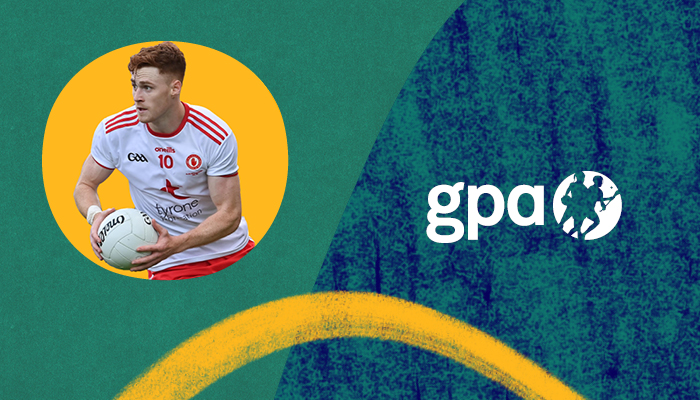 We've partnered with Gaelic Player's Association (GPA) to offer all of their 4,000 members access to our digital mental health and wellbeing platform. As part of the launch Jennifer Rogers, Player Development Manager at GPA sat down with GPA member and All-Ireland winning Gaelic player Conor Meyler to chat about his own personal experience with mental health and the important impact it has on sports and athlete performance.
We've partnered with Gaelic Player's Association (GPA) to offer all of their 4,000 members access to our digital mental health and wellbeing platform. As part of the launch Jennifer Rogers, Player Development Manager at GPA sat down with GPA member and All-Ireland winning Gaelic player Conor Meyler to chat about his own personal experience with mental health and the important impact it has on sports and athlete performance.
Do you think mental health is something that is talked about in sporting circles generally? Aside from how best mentally prepare yourself from a performance standpoint
I think it is an area people are cautious about and at times scared to speak about. It’s seen as a negative thing when really mental health is something we all have, there is a big difference between mental health and mental illness. Some people are able to manage their mental health better than others with good coping strategies. The thing is, we all face tough times mentally, as we do physically with the likes of injuries and lack of form but we have people in place to help and support with the physical side and we could do with more help with the mental side.
How do you contend with pressure?
I have got better at managing this in recent seasons. Pressure is a privilege, nerves come when something is meaningful and important to you. The nerves provide the same physiological outcome as excitement. Sometimes I sit back and remind myself that it’s just a game, nothing changes. I bring myself back to why I play, the games growing up as a child and try and enjoy the experience. I used to find putting more pressure on myself lead to underperforming as I had hyped the game up to be something more important than it was.
Do you find participating in sport helps you cope better with pressure from other aspects of life?
I think what we learn through sport is transferrable across all aspects of life. I have found that when I apply the drive and discipline I have for training and football in my professional life is has been very beneficial.
How does playing a team sport have an effect on your mental health?
From competing in athletics and cross country when I was younger I found a big difference between individual sports and team sports. Training on your own can be very mentally challenging but essential at times. My background in running has been beneficial in this aspect. The reason I love team sports is the comradery and buzz you get from training with friends and the time spent outside of training together. At the inter-county level, you spend so much time with your teammates on and off the field and you grow very close. Having teammates there who have been/are currently going through the same struggles you are, you can connect and bond with them on a deeper level as they know and understand what you’re going through and how demanding the game can be even in your personal life.
How do you unwind to avoid mental burnout/fatigue?
Spending time with my girlfriend, family, and friends talking about and doing things non-football-related. I enjoy spending time with my dog, going for walks, coffee, or lunch with good friends. I have found it to be important to have things outside of sport to do to ‘switch off’ and get away from it. Sport can be all-encompassing if you allow it to be and I have experienced this in the past. Remembering that it is just a game and doesn’t define you has been great for me. I enjoy going swimming in the sea for recovery or heading over to the Infrared Sauna at my friend Richy Donnelly’s spot Natur and Co.
Is routine a big part of your life? If so, is it mostly a positive or negative?
I like routine, I have a good morning and bedtime routine. I think good habits are important for performance. It keeps you accountable and you realise the small daily habits make the big differences.
As with any player in any sport I'm sure you’ve had your fair share of negative comments thrown your way, both in-person and online, how has this affected you and how do you deal with it in a positive way?
I have had plenty. I try my best to block it out and not acknowledge any noise outside of my close circle but it’s a lot easier said than done. I think people don’t always realise the effect their words can have on others, especially online. Online abuse is easy as people hide behind their screens or keyboard. It actually tells me more about that person and their own insecurities and problems when they take the time to slander someone on a public forum.
Previously I would have used setbacks and negative comments to motivate me to kick on and prove people wrong. This motivation doesn’t last and long term it isn’t healthy. Recently I have become so comfortable in accepting who I am and blocking out negative comments. At times now I can listen to them and let them go. I know who I am and what makes me, me; therefore, people’s opinions outside my close circle are irrelevant.
If you could give any advice to yourself when you were younger about mental health and sport, what would it be?
It’s just a game, it won’t define you as a person, it’s merely one facet of your life. Give it sweat and courage and then whatever happens happens, you can’t control it. Be yourself outside of the team, in the changing room, and on the field. Do what you feel is right and what you need to do, and say what you need to say. Not everyone will like you or agree with you but you can always go home happy and look in the mirror when you know you have been yourself and given everything.
Learn more about how you can support your athletes or sports and fitness members with their mental health and wellbeing.







